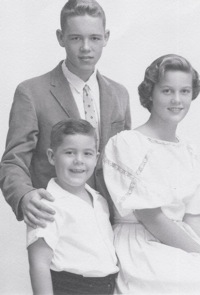The Way We Were: Doug Milne

Doug Milne wears many hats — husband, father, grandfather, attorney, civic leader,mentor, friend and local historian just to name a few.
Moving from the Northwest in 1946 at the age of three with parents Doug and Betty andinfant sister Mary, Milne’s wide-angle view of Jacksonville’s civic characterbegan on the patrol boy drill field of Lackawanna Park.
“There were not as many cars when I grew up. Sections of town were more isolated fromone another. My friends and I did not visit other sections of Jacksonville veryoften. Indeed, we called Avondale Our Town.
I didn’t realize that Greater Jacksonville was a collection of Our Towns, eachwith its own unique history and culture. My patrol boy drill days introduced meto kids from Springfield, Ribault, Wesconnett, and Arlington, and they helpedme understand that different parts of Jacksonville are like various creeks thatdrain into the St. Johns. They have unique names but they all flow into thesame river.
Two other events helped me broaden my civic outlook. I was selected as arepresentative to a YMCA world youth conference when I was a 17-years-oldjunior at Lee HS. This was a 10-day residential experience in Hilversom,Holland. I lived with youth representatives from 48 different countries. It wasquite the experience as was Florida Boys State that same year.”
The river itself was a playground for Milne and his friends, David Nussbaum,Michael Hughes and Michael Fisher (who ran away from home every day and livedwith Doug’s family until dinner.)
“J.F.Bryan had a ski boat that he shared. We water-skied behind it. We fished, too,and that is a sport I still love. When we weren’t on the river, we sometimeswere in the streets. Pine Street, where I lived, was always full of activities.
One of the activities was cork ball, a game created by Chuck Rogers, director of cityparks, and father of legendary Lee football coach, Corky Rogers. The gamerequired that you wrap a cork in tape and position two pennies on it. You hitit with a broom handle and ran. A good player could make that cork dance.
Later, during high school at Lee, I participated in Hi-Y and in more structuredathletics, baseball primarily. I was also on a Beaches baseball team that waswritten up in a local newspaper as “The Boys of Summer” even though we weren’tall that good.”
But play was only one part of the era’s equation.
“When I was 14, I got a Times Union paper route which consisted of morning deliveryfor 138 papers. My father informed me that the route was more about theimportance of work than it was about the money. It did teach me about work. Iam forever thankful that on frigid or rainy morning, my mother would get up at4:00 a.m. and drive me around the route. Collections were always on Friday.
The money I did make went farther then. Hamburgers at the Avondale drugstore were25 cents and a shake was 25 also. With two cents tax, that meant lunch was 52cents total. At one point, too, my mom would take carloads of my friends and meto the Edgewood movie theater where we could watch two features, a cartoon anda newsreel, eat popcorn and a hotdog and not spend an entire dollar. Somethings have changed.”
And some things have not. Milne’s children Doug, Joey, Mary Susan and William grewup in the same neighborhood where their father played champion cork ball. Milneand his wife Nora, an adoption and foster care administrator, live two blocksfrom the Pine Street house where his mother still lives. After spending time atthe University of the South, Sewanee and the University of Florida law school,Milne returned to Avondale to nourish the deep struck roots of friends, familyand community.
By Victoria Register Freeman







